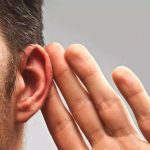 A noise in the ears, often described as ringing or roaring.
A noise in the ears, often described as ringing or roaring.
A noise in the ears, as ringing, buzzing, roaring, clicking, etc.
Ringing or buzzing in the ears.
A relatively continuous ringing sound in the head with no apparent external source.
A condition in which someone hears a ringing sound in the ears.
A type of ear and hearing problem involving persistent ringing, whistling, buzzing, tinkling, or other annoying noises in the ears. These results from disturbances of the acoustic nerve that transmits to the brain electrical signals unrelated to external sounds, making it a sensorineural problem. The causes of tinnitus are not fully known, but in children it is sometimes associated with trauma, head injury affecting the ears, or otosclerosis.
Ringing in the ears; it may be a sign of trauma to the ear area, Meniere’s disease, or an accumulation of ear-wax.
Ringing in the ears due to a variety of causes, such as a disorder of the ear.
The sensation of persistent or intermittent ringing, hissing, tinkling, whistling, roaring, buzzing, chirping, or other abnormal sounds in the ears or head in the absence of external sound. The tones may be single or multiple. The sensation can cause minimal discomfort or be severe and extremely disturbing. The condition, often described as ringing in the ears, is sometimes associated with hearing impairment. Subjective tinnitus is the term for head sounds heard only by the person with the condition. Objective tinnitus, caused by abnormalities in blood vessels around the outside of the ear or by muscle spasms, produces clicking or crackling sounds inside the middle ear that may be audible to others.
Any noise (buzzing, ringing, etc.) in the ear. The many causes include wax (cerumen) in the ear; damage to the eardrum; diseases of the inner ear, such as otosclerosis and Meniere’s disease; drugs such as aspirin and quinine, and abnormalities of the auditory nerve and its connections within the brain.
A noise heard in the ear without any external cause. It often accompanies deafness, and severely deaf patients find tinnitus as troubling as if not more so than the deafness. It can be provoked by exposure to loud noise, head injury, various diseases of the ear or as a side effect of certain medication. In patients with conductive hearing loss, tinnitus may be the consequence of the blocking of outside noises so that their own bodily activities become audible. Even healthy people occasionally suffer from tinnitus, but rarely at a level which prompts them to seek medical advice. Present knowledge of the neurophysiological mechanisms suggests that the noise ‘arises’ high in the central nervous system in the subcortical regions of the brain. Occasionally, tinnitus is produced by sound generated within the body by vascular tumours or abnormal blood flows: (objective tinnitus).
A subjective ringing, buzzing, tinkling, or hissing sound in the ear. For some patients, this causes only minor irritation; for others, it is disabling.
A perceived sound like ringing, buzzing, whistling, or hissing in one or both ears when no external noise is present.
In cases of tinnitus, the acoustic nerve sends signals to the brain not because of external sound waves, but due to unidentified internal stimuli either within the ear itself or inside the head. Tinnitus is often linked to hearing loss, especially age-related hearing loss known as presbyacusis, or hearing loss due to exposure to loud noises. The condition may also be a symptom of various ear-related issues like labyrinthitis, Ménière’s disease, otitis media, otosclerosis, ototoxicity, or a blockage of the ear canal due to earwax. Certain medications, such as aspirin or quinine, as well as head injuries, can also trigger tinnitus.
The sound experienced in the ear may vary in type or loudness at times. In the majority of cases, though, the noise is constant, even if the person affected doesn’t always notice it. The level of discomfort tinnitus causes differs from person to person. While many learn to adapt and coexist with the condition, others find it extremely difficult to tolerate.
If possible, any root cause of the condition is addressed in treatment. Many who experience tinnitus employ different methods, like using a radio, TV, cassette player, or headphones, to drown out the internal noise. A tinnitus masker, a device similar to a hearing aid that emits white noise (a combination of various sounds across a broad spectrum of frequencies), can also be effective.
A noise in the ears that can resemble a humming, swooshing, or thundering sound. It might be high-pitched, similar to the whistle of steam, or low-pitched, akin to the rumble of a subway train. Sometimes it’s caused by the hardening of the tiny artery in the eardrum, leading to the person hearing the sound of their own blood flow. When tinnitus occurs alongside hearing loss and episodes of dizziness, it is referred to as Meniere’s disease. It can also be a side effect of consuming too much of certain medications, like aspirin or quinine.
